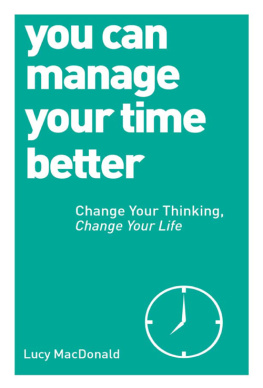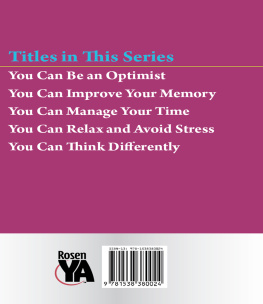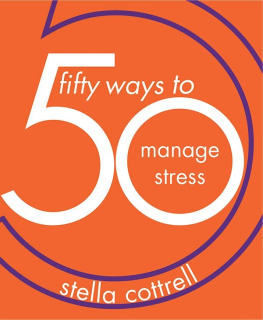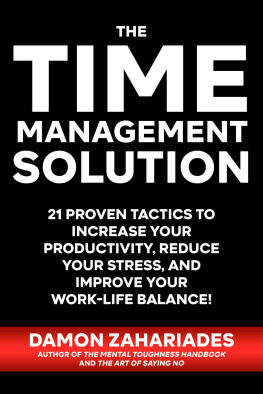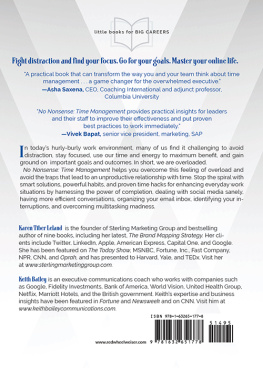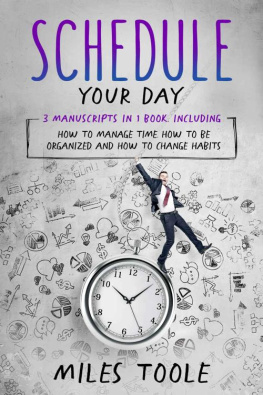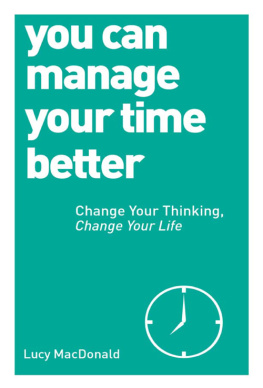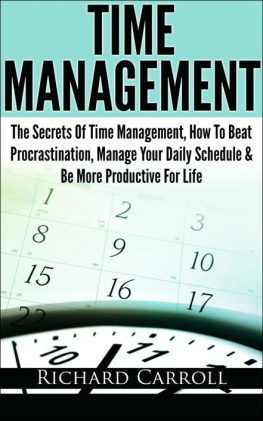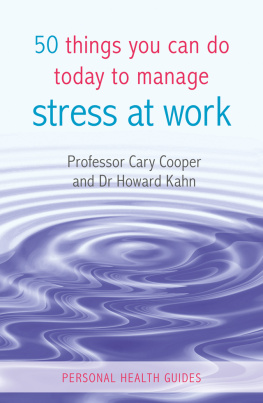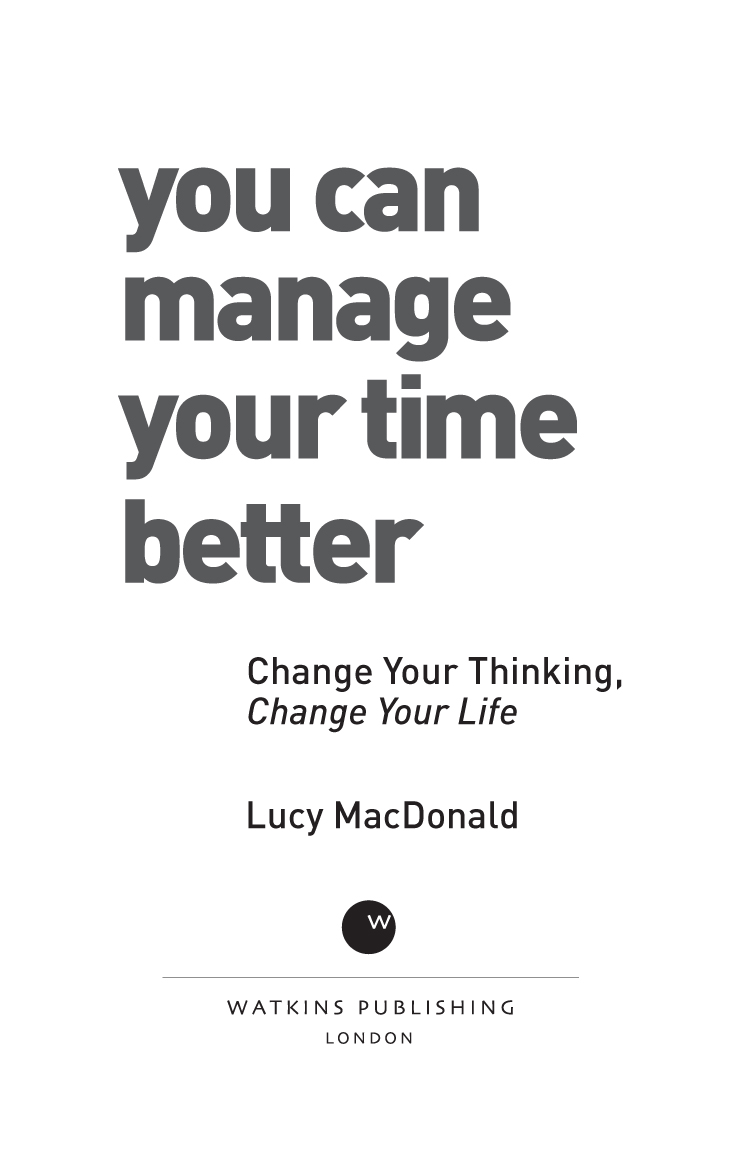Lucy MacDonald is a Quebec-based motivational speaker with an academic background in psychology and counselling. Her clients include Pfizer Canada and McGill University.
To my father, Bernard Filliol,
who taught me my first
and most important lesson
in time management,
and
to my mother, Aline Filliol, who taught me the
importance of making
time for myself.
contents
introduction
W eve all been there. Running through the house looking for lost car keys, late for an appointment, thinking about the mess were leaving behind, wondering when we will have time to drop off the dry cleaning, worrying that our current work project will not get done on time, angry that the person in front of us is moving too slowly .... Hurry up, hurry up, we tell ourselves and those around us. The whole world is in our way. We feel stressed, upset, and resentful.
From the time we get up in the morning until we put our heads on the pillow at the end of the day, we think about what we have to do, and we worry about whats not getting done. We wake up in the middle of the night worrying about when we will find the time we need to complete the never-ending list of To Dos. If something goes off schedule we just give up, despairing that we will ever be able to catch up.
If this sounds like you, you are not alone. We are living in a period of the time-famished; we are hurried and harried with no end in sight. People are exhausted and overwhelmed, with no time for personal conversations, for taking a leisurely walk, for waiting patiently for a child to finish their dinner.
Having enough time is the luxury item of the moment. Today men and women and even children all around the world are experiencing increasing levels of time stress. This chronic stress is linked to poor physical and psychological health.
We all have the same 24 hours in the daily time bank. Time is the constant, so what needs to change are the choices that we make about how we use our time. Managing time is about making decisions concerning how you want to live your life. You have the life you have because of the decisions you make regarding how you spend your time. If you want a different life, you must make different decisions. If you are not convinced about this, look at the successful people you know and pay attention to how they spend their time.
My own life is an example of how managing time has enabled someone to achieve their goals. My earliest recollection of the importance of time management goes back to when I was five years old and my youngest brother, Robbie, was born. The long-awaited day when he was coming home arrived, and I so wanted to be part of the welcoming party. My father told me to hurry up and get ready. Excited, I took immense care and a long time to choose the perfect outfit for this important event only to discover that the welcoming party had left without me. I was devastated. This incident made such an impression of me that, to this date, I hate being late for anything.
My mother was also instrumental in teaching me how to manage my time. Despite having five children, she was employed in an era when most mothers did not work outside the home. She was able to keep things running fairly smoothly by maintaining a routine and being an expert in delegation, enlisting all five of us to help with daily chores.
Ive acquired my time-management skills through trial and error. Each stage of my life has presented different challenges when it comes to time, and I have had to make adjustments. I learned basic time-management skills when I became the mother of four children whose ages ranged over ten years from oldest to youngest. I quickly realized that unless I kept a very firm grip on the daily schedule, the family descended into chaos. I also discovered that it was essential to put into practice my mothers one and only piece of parenting advice: When you need time for yourself, take it, because no one will come and offer it to you.
It wasnt until I returned to university at the age of thirty nine, when my children were aged between 8 and 18, that my time-management skills became finely honed. I attended university for six years winter, spring, summer, and fall and completed a BA in Psychology and a Masters in Education Counseling Psychology. In order to graduate I used all the main time-management techniques outlined in this book. I had a vision of what I wanted to accomplish, I set myself goals, I created a plan for each semester, and I lived according to a weekly and daily schedule. I learned how to avoid procrastination, and how to deal with disruptions and time-wasters. I used my daily planner as a road map to achieve my goals much the same as I do today.
After graduation I started a private counseling practice and seminar business, and once again my ability to manage my time effectively was, and is, a tremendous advantage. As I am a self-employed businesswoman, time is the framework within which I earn a living a poor grasp of time would be reflected on my business balance sheet.
However, I wouldnt want you to get the impression that I always manage my time well. That is simply not the case. I continue to be challenged by new situations, but I am motivated to get back on track because I believe that by wasting my time I am wasting my life. Whenever I hit difficulties, I am able to renew my commitment to use my time wisely by revisiting my life purpose and goals.
Time is an extremely precious resource, and managing it well can help you to achieve your goals and your dreams. You Can Manage Your Time Better is a straightforward, step-by-step guide that can be of benefit to anyone, anywhere from a child to a retired person, and at school, at home, or in the workplace.
I hope that you will use this book to set yourself free: free from the chronic hurriedness of everyday living, free from the fear of wasting time, and free from the tyranny of having too much to do and not enough time in which to do it.
Ultimately, how you spend your time is how you live your life so spend it wisely.
Lucy MacDonald
understanding time
I wish I had more time, is a common complaint. Although we cant increase the number of hours in the day, we can decide what we are going to do with them. The first step to gaining control of your life is to understand what effective time management is and how it will help you to reduce time-related stress.
In this chapter you will discover everything you need to know to start managing your time. You will learn different ways to track how you spend your time, and how to focus your energies on the most productive and fulfilling activities. You can use the Hurry Zone quiz to get an idea of your level of hurry sickness, then follow the practical suggestions to help you slow down and enjoy life a little more.
forms of time
I f I were to stop you in the street and ask you what time it is, chances are you would look at your wristwatch and tell me. But what if I were to ask you What is time? If you are not able to answer readily, you are in good company. The concept of time has tested the greatest thinkers throughout history.
In the 17th century Isaac Newton proposed the idea that time is absolute a universal, steady process that everyone everywhere experiences in the same way. Albert Einstein challenged Newtons idea of time with his general theory of relativity that time is relative, dependent upon how fast we are traveling.
What, then, is time? If no one asks me, I know what it is. If I wish to explain it to him who asks, I do not know.
ST . AUGUSTINE (354386)

